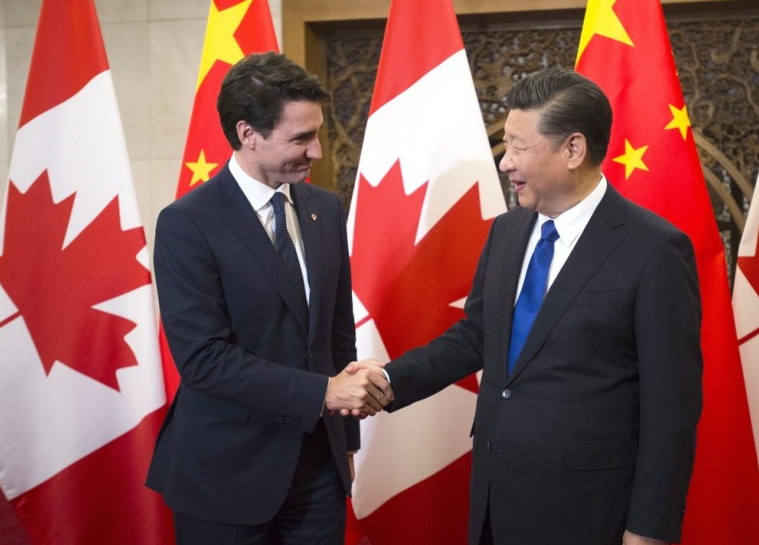
Chinese President Xi Jinping said Tuesday that China and Canada should explore new ideas and take active measures to achieve more substantial progress in bilateral ties during a meeting with Canadian Prime Minister Justin Trudeau.
Xi said during Tuesday's meeting in Beijing that both sides should increase mutual political trust. He also said China will continue to support capable Chinese enterprises in investing in Canada and welcome Canadian enterprises to take an active part in Belt and Road initiative, the Xinhua News Agency reported.
"China and Canada share common ground on many issues and our economic relationship is highly complementary. However, deepening cooperation will touch on some sensitive areas, such as aviation and Arctic sea lanes. The US will also add obstacles in the path of Sino-Canadian cooperation," said Yao Peng, deputy director of the Canadian Studies Center of the Chinese Academy of Social Sciences.
Canada is one of the US' closest allies, but it still has divergent opinions with the US, whether over climate change, the Belt and Road initiative or the North American Free Trade Agreement, so Trudeau is also pressuring Donald Trump by embracing China, said Yao.
Putting the climate first
Xi also welcomes Canada to participate in the construction of the Belt and Road and said he hopes both sides can push cooperation on climate change and other international affairs.
China and Canada on Monday issued a joint statement on climate change and clean growth during the second meeting of the Annual Dialogue between Chinese Premier Li Keqiang and Trudeau. The two sides also agreed to establish two ministerial-level dialogues between their respective departments of the environment and clean energy, Xinhua reported.
Canada treats climate change and environmental issues seriously, and cooperation with China in these areas will receive less pressure from its domestic society, Tang Xiaosong, director of the Center for Canadian Studies at the Guangdong University of Foreign Studies, told the Global Times on Tuesday.
Compared to free trade agreements, cooperating on climate change and clean energy is much easier, Tang said.
"Many Canadian politicians and elites would like to sign an FTA with us, and Canadian people will benefit from it, but we still have differences in some areas. Many Canadian provinces have very high autonomy, and some conservative political groups have concerns over Chinese State-owned enterprises investing in Canada," Tang said.
"So that's why both sides decided to reach agreement on climate change first, since Canada has advanced technology on clean energy which is truly needed by China," Tang said. "After the US - the world's second-largest emitter of carbon - pulled out of the Paris Agreement, China became the biggest carbon emitter that is still taking responsibility to deal with climate change. In order to fulfill its promise, China needs to cooperate with countries with advanced technology, and its determination will win other countries' full support."
During his talks with Trudeau, Li affirmed the positive roles of the annual dialogue between prime ministers, the annual meeting of foreign ministers, the economic and financial strategic dialogue, as well as the national security and rule of law dialogue.
Li called on the two countries to expand common interests on the basis of mutual respect, equality and mutual benefit.


